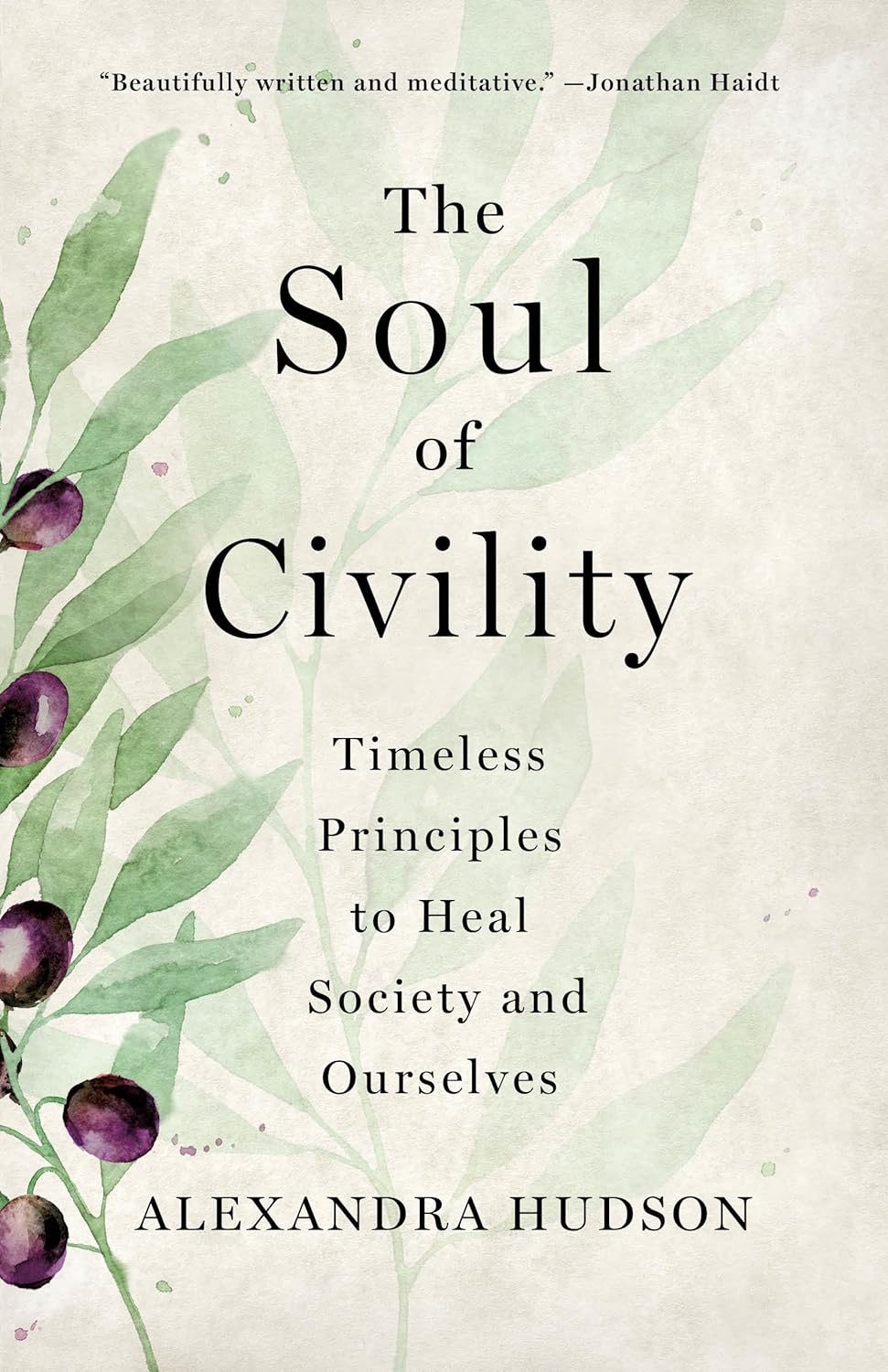Thinking about belching? Remember to look up at the ceiling. Or at least that’s what Daniel of Beccles, in his text Book of the Civilized Man, counseled men to do in the high Middle Ages when they got that queasy feeling. Alexandra Hudson eloquently discusses social mores like this one in her book The Soul of Civility, which is worth reading just for her engrossing survey of such entertaining and idiosyncratic recommendations offered by dusty manuals on manners.
Yet Hudson, a writer and an adjunct professor at the Indiana University Lilly Family School of Philanthropy, observes that individuals, especially but not limited to ambitious professionals, can use behavioral finesse—politeness, manners, mores—as a thin veil to disguise crude and self-serving opportunism, a sinister pattern she noticed while working in politics in Washington, D.C. The general contention in The Soul of Civility, then, is that politeness, channeled through manners, isn’t enough. Society needs more civility.
Hudson persuasively argues that these terms are not interchangeable. Politeness is a technique that induces a code of etiquette and focuses heavily on abiding by prescribed rules and rituals. Politeness does not carry inherently good or bad connotations. It can certainly ease social friction. But it can also serve as a devilish tool for self-advancement that breeds pride and corrupts good-faith differences in opinion, masking nefarious motivations with a wide smile. For instance, pouring lavish praise on your boss for his mediocre haircut to garner a strong performance review is flattery, a species of politeness. But compliance with behavioral expectations that in themselves lack inner moral content is insufficient.
Civility, on the other hand, is both an instrumental and an inherent good, a disposition that recognizes the fundamental dignity of human beings living in a political community. Since all individuals have equal moral worth and deserve to be treated with respect, Hudson posits, civility requires the right motivation behind an action as well as the outward customs that give this motivation visible form. Avoiding excessive praise of your boss’s haircut and complimenting him on something else you can genuinely vouch for is an example of displaying civility.
Hudson explains that civility is the guiding hand for seven aspects of a flourishing democratic society: “integrity, freedom, civil society, equality, civil disobedience, tolerance, and civil discourse.” Her principal normative argument is that civility is inseparable from and morally rooted in human flourishing, and therefore the revival of civility is necessary to strengthen civilization, civil society, and civic virtue.
The Soul of Civility includes an introduction and twelve chapters that trace various historical conceptions of civility, the relation of civility to a healthy democracy, and the relevance of these concepts to contemporary political polarization and the rise of the digital age. Chapters 10–12 offer specific applications of the idea of civility to questions regarding hospitality, education, friendship, and forgiveness. Hudson’s analysis of the importance of hospitality is particularly impressive, demonstrating that shared meals foster trust and gratitude. Most chapters conclude with practical advice about how to act more consistently in accord with the principles of civility—tips worthy of the finest medieval handbooks on incontinence and related indiscretions.
One vital application of Hudson’s defense of civility for contemporary politics is that Americans need to relearn how to disagree in a civil manner.
Hudson uses refreshingly lucid language in The Soul of Civility, avoiding academic jargon and making her insights accessible to the expert and the layman. In addition to her pithy reviews of traditional manuals on manners, Hudson marks her commentary with a graceful weave of biblical, literary, and philosophical allusions that illustrate the crucial function of civility in diffusing sentiments of attachment among individuals. Picking up on the theme of hospitality, for instance, she recounts the story of Eumaeus, the poor slave in Homer’s Odyssey who invited a beggar into his home and then fed and clothed him. The beggar turned out to be Odysseus, his master. Eumaeus’ conduct embodied the promise of xenia, the Greek word for hospitality, a term that captures the moral imperative to transform strangers into friends through acts of generosity and warmth.
One vital application of Hudson’s defense of civility for contemporary politics is that Americans need to relearn how to disagree in a civil manner—that is, in a manner that does not shun difference but still preserves high regard for the inherent dignity of one’s neighbor. This admittedly is a tension in the book that requires sharper resolution: In the introduction readers are advised to withhold counterexamples to the author’s arguments, perhaps because she contends, in the chapter on integrity, that restraining the urge to express at least some of one’s innermost thoughts sustains deeper social connections. In the same chapter on integrity, though, they are told that biting one’s tongue is sometimes an act of integrity but later are instructed to call out loved ones when they utter regrettable things. Implicit in these remarks is the insinuation that the exercise of judgment should determine when it is suitable to divulge private opinions.
In the end, The Soul of Civility imparts the message that civility does demand that the civil person speak hard truths to others, especially because he values them as individuals with irreducible dignity. Hudson keenly invokes the example of Edward Coles, private secretary to James Madison, who, in his correspondence with Thomas Jefferson, exposed the latter’s moral hypocrisy in endorsing the principle of human equality and yet maintaining ownership of his slaves. If Coles had been merely polite, he would have abstained from such criticism and effusively flattered Jefferson for the ulterior motive of advancing his career. Coles did not avoid disagreement, however, but instead conveyed discomfiting truths to a person in authority—an exercise in civility. (Of course, Coles’s appeal in the letter to Jefferson’s “goodness and liberality” and his “pre-eminently distinguished” career suggests that strategic doses of flattery themselves can mix with civility to promote a just cause.)
The civil disposition, then, calls for the appreciation of variety in perspective and background. This is why the recognition of one’s inherent dignity is critical for Hudson’s argument: if human beings are treated as individuals with equal moral worth in a political community, then they can engage in good-faith disagreements with others over political and social matters without enduring the degradation of their souls. A difference in opinion is not a difference in moral status.
Yet the most significant lesson of The Soul of Civility is its timely reinforcement of the credo that civilized society depends on the character of its citizens, and the character of its citizens depends on a code of manners that escape the written word. In this sense, there was a touch of ambiguity in the book’s distinction between the mores and manners of politeness and those of civility, since at least some of the recommendations in the manuals on manners reflect polite behavior and would not necessarily rely on purified intent (like the proper way to belch). Taken in the context of Hudson’s larger argument, the core message is that the best kind of mores and manners are those nourished by the right kind of motivation, which, free from the formulaic mien of rulebooks and decrees, can thereby cultivate a political community inspired by the soul of civility.
Accordingly, what Hudson calls “informal cultural norms of self-governance and self-sacrifice” inculcate in citizens habits of virtue that nurture their well-being. While the social contract between government and its citizens is a “vertical” relationship, civility is the unwritten contract that constitutes the “horizontal” relationship of a community of individuals with equal dignity. As she aptly puts it, “civility is the social contract that supports the social contract.” A society’s members bear the duty to meet the moral obligations of this contract by treating all human beings with intrinsic dignity, a kind of Aristotelian–Kantian fusion that powers the ethical argument of The Soul of Civility.
This point is immediately relevant to Hudson’s broader diagnosis of civility throughout the book. Not only is civility distinct from politeness, but it is also distinct from the formal, written expression of rules, regulations, edicts, and procedures mandated by political institutions. The more human beings organically treat their fellow men with inexhaustible dignity and respect, the less they need government to regulate their private social interactions.
The implications of Hudson’s argument are numerous. Because dignity is the essential criterion of Hudson’s concept of civil behavior, the problem arises of how to arbitrate competing claims of dignity, such as disagreements over the tension between a Christian business owner’s exercise of religious liberty and a gay individual’s access to public accommodations. A concrete example or two teasing out this tension, such as the debate over the refusal of Jack Phillips, the owner of Masterpiece Cakeshop, to bake a cake celebrating same-sex marriage, would have sharpened the relevance of dignity to the distinction between civility and politeness. This question is especially pertinent since the word “dignity” itself can mean vastly different things depending on its context. And if one grants that the soul of civility must account for practical utility and inescapable tradeoffs, the question emerges whether it is even possible to treat all human beings with irreducible dignity.
Second, Hudson wisely observes that the practice of civility starts in the home and in local social associations. But stronger consideration should be given to the disproportionate power of political, cultural, and corporate elites to shape standards of civility. In the chapter on polarization and tolerance, she provides some general remarks on the role of public leadership in advancing human well-being and hints at the Procrustean political orthodoxies of civic organizations, universities, and businesses. Yet there may be a limit to how much civility can be practiced in a political community when these influential institutions fail to communicate that a person’s expression of a heterodox view is not synonymous with an attack on the moral worth of his interlocutor. Even more, while these institutions might lack civility, the crux of the problem may be that they lack courage (qualities that overlap but are not identical).
Third, while Hudson responsibly avoids partisan politics, there may be inherent constraints to promoting civility in neighborhoods and communities when administrative centralization continues to crowd out local sources of social attachment. Hudson is certainly aware of the totalizing nature of politics today; the logic of her argument, when coupled with her judicious observation that self-regulating civility requires few laws, naturally leads to support for the diminution of concentrated political power in Washington, D.C. What, then, is the explicit connection between reviving civility and resisting the sway of centralized political institutions that discourage the formation and preservation of organic social ties?
The Soul of Civility is the best recent synopsis of the indispensability of civility for a free polity. It should be required reading not only for the polite yet opportunistic colleague but also for the caterwauling grenade-thrower on social media, who, precisely because he attacks his adversary ad hominem, relinquishes the opportunity for the type of robust debate that would entail mutual recognition of each other’s dignity. Rather than exchanging incoherent shibboleths stuffed into 280 characters online, perhaps the most appropriate way to take the book’s message to heart is to engage in a vigorous but civil dialogue with one’s neighbor face to face—and then invite him over for a meal afterward. It sure beats belching.















